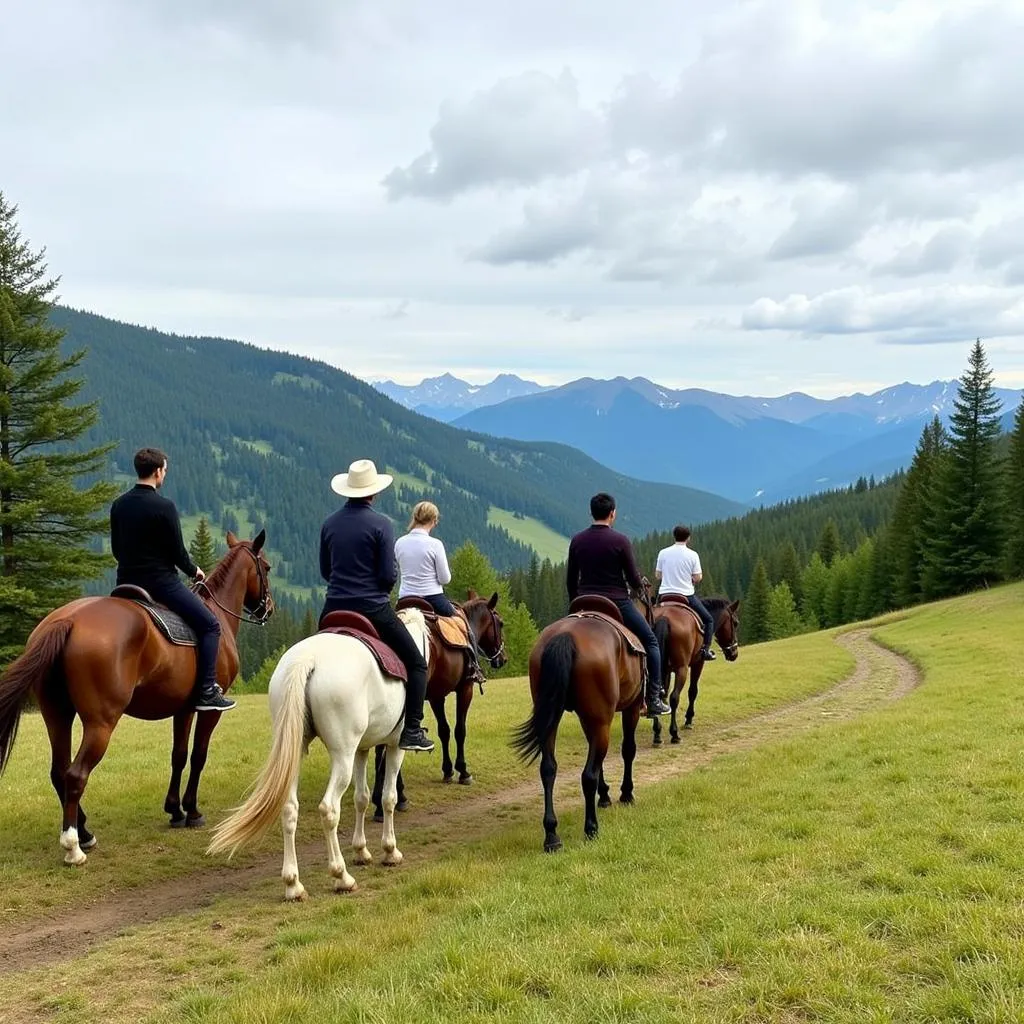Horse riding can be an exhilarating and rewarding experience, but it’s important to understand the costs associated with it before you saddle up. Horse Riding Fees can vary widely depending on factors such as the location, type of riding, duration, and experience level.
This article will guide you through the different factors influencing horse riding fees and provide insights into what you can expect to pay. We’ll cover topics like trail riding, lessons, boarding, and even horse ownership.
What Influences Horse Riding Fees?
Several factors contribute to the cost of riding horses, making it essential to research and understand these variables before booking your first ride.
1. Location:
Location plays a crucial role in determining horse riding fees. Urban areas with high demand for equestrian activities tend to have higher prices. Rural areas or locations with fewer facilities may offer more affordable options.
2. Type of Riding:
Different types of riding come with varying price tags. Trail riding, which involves riding on established trails, is often more affordable than lessons or guided excursions.
Here’s a breakdown of common riding types and their associated costs:
- Trail Riding: This usually involves riding on designated trails, often through scenic landscapes. Prices can range from $30 to $100 per hour, depending on the trail’s length and difficulty.
- Lessons: Lessons are crucial for beginners and riders looking to improve their skills. Fees typically range from $40 to $80 per hour, depending on the instructor’s experience and location.
- Guided Excursions: Guided excursions offer a more immersive riding experience with expert guidance. These can be significantly more expensive, ranging from $100 to $300 per person, depending on the duration and the activity level.
- Competitive Riding: If you’re interested in competing in equestrian sports, fees can be substantial, including entry fees, training costs, and equipment expenses.
3. Duration:
Longer rides or lessons naturally cost more. Horse riding fees are often calculated based on the duration of the activity, with hourly rates being the most common.
4. Experience Level:
Your experience level can affect the cost of horse riding. Beginners may have to pay slightly more for additional supervision and guidance. Experienced riders can often access more advanced riding options at a slightly lower cost.
5. Horse Breed and Quality:
The breed and quality of the horse can also influence the cost of riding. Rare breeds or highly trained horses may have higher riding fees due to their specialized care and training requirements.
How to Find Affordable Horse Riding Options
With a little research, you can find affordable horse riding options. Here are some tips:
- Check local farms and stables: Many local farms and stables offer affordable trail riding, lessons, and even boarding opportunities. Contact them directly for their pricing and availability.
- Consider group rides: Group rides often offer discounted rates compared to private rides.
- Look for introductory packages: Some facilities offer introductory packages that include multiple rides or lessons at a discounted rate.
- Check for seasonal specials: Many stables and farms offer seasonal specials or discounts for certain times of the year.
Frequently Asked Questions
1. What is the average cost of horse riding lessons?
The average cost of horse riding lessons varies depending on the instructor’s experience, location, and the type of lessons. Expect to pay between $40 to $80 per hour.
2. How much does it cost to board a horse?
Horse boarding fees can range from $200 to $800 per month, depending on the level of care, facilities provided, and location. Boarding costs typically include stalls, pasture access, feed, and veterinary care.
3. What are some hidden costs associated with horse riding?
Besides the initial riding fees, you might also have to factor in the cost of:
- Equipment: This includes saddles, bridles, helmets, and other necessary riding gear.
- Lessons: If you’re a beginner, you’ll likely need to take lessons to improve your skills.
- Vet bills: Horses require regular veterinary care, including vaccinations and routine checkups.
- Farrier: Horse hooves need regular trimming and shoeing, requiring the services of a farrier.
4. Is horse riding a good investment?
Horse riding can be a significant investment, especially if you’re planning to own a horse. However, the experience and benefits it provides can be rewarding.
5. Where can I find affordable horse riding options near me?
To find affordable horse riding options near you, try searching online using keywords such as “horse riding near me,” “trail riding,” or “horseback riding lessons.” You can also check local farm listings and community bulletin boards.
Conclusion
Horse riding fees vary widely, but with careful research and planning, you can find affordable options that fit your budget. Understanding the factors influencing costs will help you make informed decisions about your riding experiences. From trail riding and lessons to owning your own horse, the world of equestrian activities offers something for everyone.
 Horse riding on a beautiful trail
Horse riding on a beautiful trail
Remember, your safety and the well-being of the horse are paramount. Always choose reputable facilities, follow safety guidelines, and be respectful of the animals. If you have any questions, don’t hesitate to reach out to a local equestrian professional for guidance.
When you are ready to explore the world of horseback riding, contact us! We are here to help you find the perfect riding experience, connect with expert instructors, and answer any questions you may have. Don’t forget to check out our other resources on horse boarding, horse sales, and more.
Contact Us
- Phone Number: 0772127271
- Email: [email protected]
- Address: QGM2+WX2, Vị Trung, Vị Thuỷ, Hậu Giang, Việt Nam
We look forward to helping you embark on your equine journey!